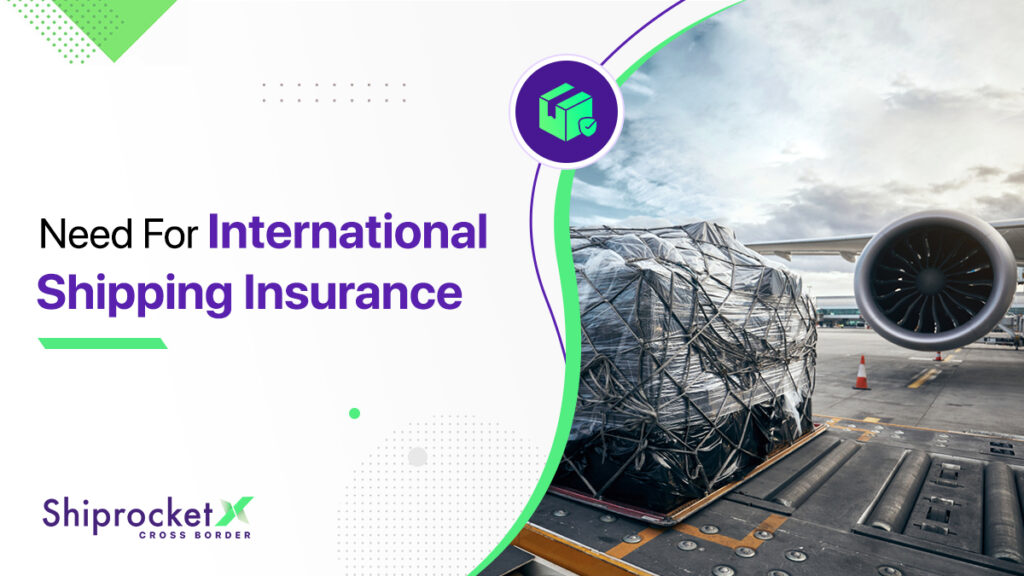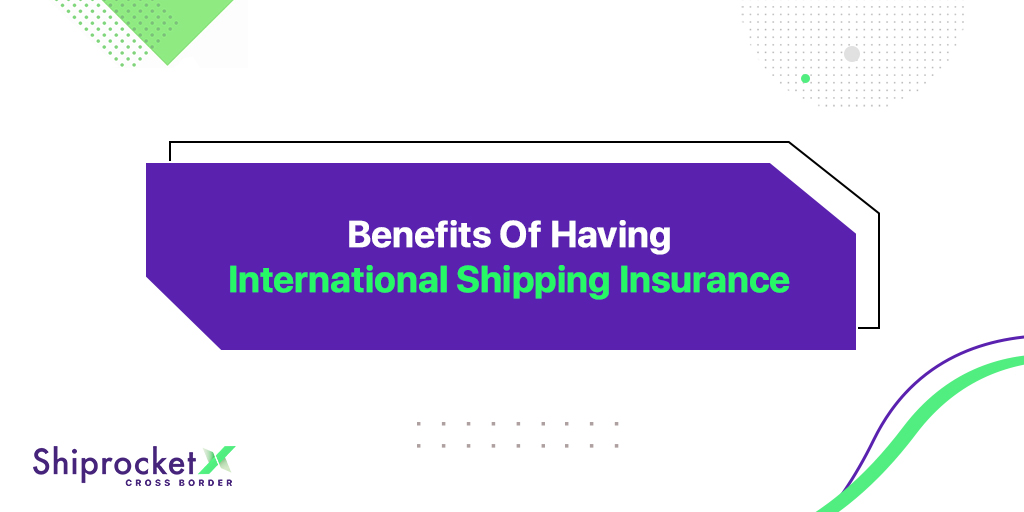Essential Guide to International Shipping Insurance
- What Do You Understand by Shipping Insurance?
- Why is International Shipping Insurance Important?
- Types of International Shipping Insurance
- Benefits of Having International Shipping Insurance
- What Are the Risks of Shipping Internationally Without Insurance?
- Factors to Consider While Choosing a Shipping Insurance
- Final Thought/ Conclusion
Shipping goods from one location to another is full of problems and risks. Natural disasters, theft, damage, losses, etc., threaten the delivery of valuable shipments nationally and internationally. Thus, a shipping insurance helps businesses and individuals by providing a safety net, peace of mind, and financial protection by providing coverage policies.
A shipper can acquire shipping insurance to be paid for lost, stolen, or damaged shipments while enroute with a courier. It can be purchased at the time of shipment from couriers or third-party suppliers, with prices depending on the claimed value of the goods. Various shipping insurances in the market help you choose the correct coverage policy to protect your business, assets, build customer relationships, etc. But what exactly is a shipping insurance and why is it so important? Keep reading this blog to understand the importance of a shipping insurance and the different options available in the market.

What Do You Understand by Shipping Insurance?
Shipping insurance is an insurance coverage that is designed to protect the value of goods throughout their transportation from one place to another across the globe. It provides financial compensation to the shipper or the recipient in case the shipment is lost, damaged, or stolen while shipping. Insurance coverage is an important aspect of logistics and supply chain management, especially in international trade. Insurance policies can be acquired directly from a carrier or a third-party insurer, and they are available for single shipments or as a customised long-term plan. While shipping insurance is open to anyone, it is most commonly utilised by firms that deliver products in large quantities or of high value.
- E-commerce firms use shippers to fulfil consumer orders.
- Large or high-value item manufacturers and distributors.
- Businesses that ship internationally use a variety of forms of transportation.
Every shipping incident disrupts the supply chain and requires additional efforts for these companies. The use of shipping insurance coverage is important to mitigate the losses and risks, provide financial protection, and ensure smooth and reliable shipping services.
Why is International Shipping Insurance Important?
International shipping insurance is essential for safeguarding the goods or packages throughout their transportation journey in this complex and unpredictable world of global logistics. Insurance is important for several reasons:
- Protection against any loss and damage: International shipping insurance covers the value of goods in case of any loss or damage due to several reasons like weather, accidents, rough handling, theft of goods, or any other natural disasters. The insurance will make sure that the sender or receiver does not have to go through any financial loss.
- Avoid financial risks: Insurance minimises financial risk by making it more manageable and less scary for the exporters or receivers while maintaining the financial health of the business.
- Follows regulations: Insurance while shipping goods makes sure that they comply with international shipping regulations and avoids any legal complications or penalties.
- Smooth customs clearance: Shipping insurance also provides a smooth customs clearance process by managing the documents and contracts beforehand.
- Covers liabilities: International shipping insurance covers liability while protecting shippers from any legal or other claims if the goods cause any damages or harm to the carrier during transportation.
Types of International Shipping Insurance
Various international shipping insurances are available, each offering different levels of coverage for the shipment. Understanding them will help shippers and recipients choose the best insurance for them. Some of them are mentioned below:
- All Risk coverage insurance: It is the most comprehensive type of shipping insurance, which covers a wide range of risks like theft, loss, damage from external reasons, etc. This insurance is appropriate for valuable and fragile items that need of extensive protection and coverage.
- Named peril coverage insurance: It is also known as specified peril coverage, as it protects goods against risks that are mentioned in the policy. This generally covers perils including fire, collision, theft, etc. It is less comprehensive but acts as an affordable and customisable coverage option for specific risks.
- Total loss coverage insurance: It only provides compensation if the entire shipment is lost or destroyed and does not cover for any partial losses or damages. This insurance is generally taken out for bulk shipments where the risk of all the goods is a concern.
- Third-party liability insurance: It covers damages caused to third parties in the journey of transporting a shipment from one location to another. It includes damage to others’ property, goods, or individuals.
- Warehouse-to-warehouse coverage: This coverage extends the insurance protection from the origin warehouse to the final destination warehouse. It covers the entire journey, including all the stops and transshipments.
- Marine cargo insurance: It is a common type of insurance that covers damages or losses that have occurred due to storms, sinking, or piracy while being transported by sea.
- Air cargo insurance: It covers damages or losses that have occurred due to air crashes, turbulence, or other air transport-related risks.
- Land cargo insurance: It covers damages or losses that have occurred due to theft, accidents, or natural disasters while being transported by land.
- Open policy insurance: It is ideal for businesses that frequently ship goods internationally, as it provides continuous coverage for all shipments for a set period under a single policy. The set period is generally a year.
- Contingency insurance: This insurance provides coverage in cases where the primary insurance (purchased by the buyer) of the goods does not respond.
Benefits of Having International Shipping Insurance

Even the most well-known transportation companies are not immune to failure and losses. If you as a businessperson or an individual have insurance, you will get numerous benefits as the shipping insurance will cover any delayed shipments or damage to your belongings. Other key benefits of having international shipping insurance are mentioned below:
- Added Assurance: Knowing that your delivery is insured is a vast comfort with many other concerns about moving overseas. You won’t have to worry about additional expenses if your shipment has problems.
- Financial protection: Insurance covers the value of goods and shipment in case of any losses, theft, or damages to it.
- Protection Against Incidents: The correct insurance covers your carried goods and any costs incurred due to typical failures. Things like pirate attacks and fires might cause delays and raise rates, but this form of insurance will cover these expenses.
- Risk management: It helps manage and mitigate risks related to international shipping involving possible events like natural disasters, piracy, accidents, etc.
- Liability coverage: Insurance also protects your shipments from any legal claims that could come from any damages or losses to any goods, protecting businesses from costly legal lawsuits.
- Trading: Insurance can reduce the financial risk of shipping, and it makes it easier and safer for businesses or individuals to engage in international trading.
- Customer satisfaction: It ensures timely compensation for lost or damaged goods and maintains customer trust, reliability, and satisfaction, which are important for business reputation.
- Comprehensive coverage options: There are multiple types of insurance policies available in the market that help businesses or individuals cover different types of transport and risks. There are also customisable insurance options to meet varied shipping needs of different individuals.
- Cost efficiency: Insurance can be an additional cost, but it can also save important amounts of money in the future by covering possible losses and damages, which can be much higher in cost than insurance.
- Increase credibility: Opting for shipping insurance can increase the credibility and reliability of the business for customers, suppliers, partners, etc., and build stronger relationships with them.
What Are the Risks of Shipping Internationally Without Insurance?
Shipping without insurance can put any company in a vulnerable spot as if something goes wrong with the shipment before it is delivered, it will potentially increase fulfilment expenses. Various risks can hinder your international shipping if you don’t have an insurance:
- Financial loss: If you are a shipper or a buyer and send your shipments internationally without any insurance, you will have to bear the cost of any losses or damages to the high-value shipments.
- Thefts and piracy: International shipments that are transported by sea have the possibility of theft or pirate attacks. And in such cases, the uninsured shipments will have no protection against such losses.
- Damage during transportation: You will have to bear the cost of rough handling, accidents, weather conditions, etc., if you don’t have an insurance for the shipped goods.
- Natural disasters: Natural disasters like earthquakes, hurricanes, or floods can damages the goods during transportation. Not having an insurance will result in hefty financial losses.
- Accidents: Transportation insurances for ships, planes, trucks, etc. can cause complete loss or damage to shipments. And without insurance, the shipper and receiver will have to cover the cost of repairs.
- Customs issues: Any delays, confiscations, or detentions at the customs counter can lead to major financial losses, and insurance can help lower the financial impact of those.
- Limited trade opportunities: Some international trade partners need insurance as a condition to do business, and a lack of insurance can limit trade opportunities and partnerships.
Factors to Consider While Choosing a Shipping Insurance
When you are choosing shipping insurance for international shipments, it is important to consider multiple factors to make sure that the chosen insurance is covering all your needs. Some of the common and important factors to consider are:
- Examining the nature, value, and fragility of the goods being shipped helps in analysing the type of insurance needed, as high-quality or damaged goods may require more comprehensive or customised insurance options.
- Understand clearly the scope of coverage provided by the policy, including the protection against different losses, theft, damage, and delays. Make sure that you choose a policy that covers all the possible risks for your shipment.
- There are different methods of transportation used for shipments, and each poses different risks. Thus, choose a policy that covers all the potential risks relevant to your shipment.
- Take a look at the exclusions in the insurance policy to understand the limitations of your insurance.
- Check the policy limits to see the maximum amount that an insurer will pay and if there will be any deductibles. Make sure such limits are appropriate for your shipment value and requirements.
- Compare the cost of insurance from different insurance providers to examine the premiums and coverage offered by different insurance providers. Look for the option best suited to your requirements.
- Look for claiming processes like the documentation required, timeframes, etc., to understand the time it will take to claim and settle in.
- Read the terms and conditions of the insurance policies, understand them properly, and determine if they meet your requirements.
- Make sure to verify the duration of the entire shipment, from the origin point to the final destination, including warehousing, etc.
Final Thought/ Conclusion
Navigating in the complex industry of global logistics without any safety net or insurance is a huge gamble for businesses and their financial health. While most shipments arrive on schedule and in good condition, there are still various hazards associated with delivering products internationally. More consumers feel comfortable buying high-value products through eCommerce but shipping those products internationally without an insurance can be an unpleasant experience for you as a business or customer. Multiple losses and damages can happen with the shipment during transportation.
From protecting from losses and damages to ensuring a smooth customs clearance and compliance with international regulations, it is important to have a shipping insurance as your backup.
While the carrier covers all shipments to some extent, shipping insurance provides additional protection and convenience for a relatively small payment. Shipping insurance compensates for the total value of any damaged or missing shipments allowing you to keep your cash flow in check, provide prompt customer service, and have peace of mind. Thus, don’t let the absence of an insurance sink your shipment, financial stability, and your peace of mind; take insurance today to deal with the challenges of international trade.






